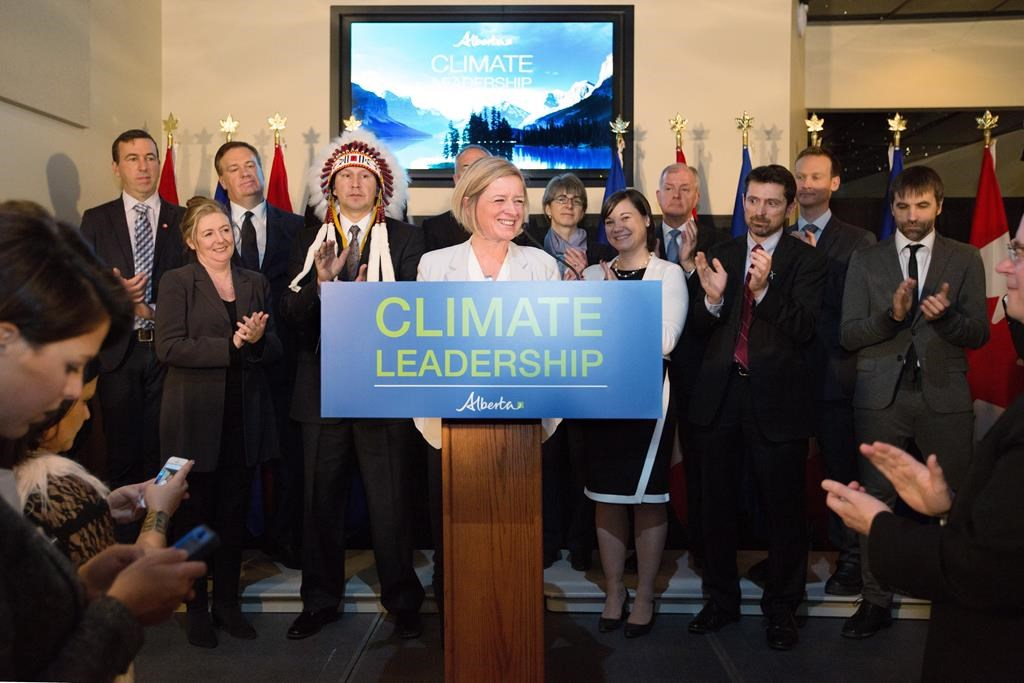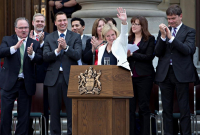Support strong Canadian climate journalism for 2025
The Alberta government is speeding ahead with aggressive action to address climate change, introducing new legislation on Tuesday that would require the province's population and industry to pay for their pollution and reduce energy consumption.
Environment Minister Shannon Phillips tabled her government's climate change legislation - Bill-20, the Climate Leadership Implementation Act, exactly one year after her New Democratic Party assumed power and ended 44 years of Progressive Conservative governments ruling the province.
She said the new law would deliver on the New Democratic government's promise from last November to respond to the challenge of climate change while focusing on the priorities of everyday Alberta families.
“For too long, governments in Alberta chose to ignore and deny the problem," Phillips said at a news conference. "That approach didn’t work.”
Alberta is home to the world's third largest crude oil reserves after Saudi Arabia and Venezuela but its economy has been pummeled for nearly two years by a significant drop in global commodity prices.
If adopted, the Climate Leadership Implementation Act would apply the NDP government's new carbon tax, pricing carbon at $20 per tonne in 2017, before raising the levy to $30 per tonne in 2018.
That means Alberta consumers can expect to pay an additional 4.49 cents per litre of gasoline beginning in 2017 before that cost rises to 6.73 cents in 2018, alongside a natural gas levy collected by providers like ATCO or Enmax.
The legislation also amends personal income tax regulations to allow for rebates of $200 for single adults, $300 per couple, and $30 per child to offset the direct costs of the carbon levy in 2017. The government will issue rebate cheques in January 2017 for households with incomes lower than $95,000 per couple or $47,500 per individual. Sixty per cent of Alberta households will receive the full rebate, with six per cent of households getting a partial rebate. The government plans to adjust the criteria in 2018 when the levies increase.
Phillips said lower-income users would wind up coming out ahead, given that the average carbon rebate recipient would receive more than they will pay toward the carbon levy. The government estimates the carbon levy will cost the average household $338 in 2017, while most families will collect $360 in rebates.
But the government also estimates that households will pay additional indirect costs between $70 and $105 per year. That number is calculated based on the cost of imported goods like food — over 70 per cent are imported to Alberta — and clothes — 90 per cent are imported. The upper end of that estimate assumes that retailers will pass on around 75 per cent of the cost of the levy to consumers through higher prices, while the lower end assumes 50 per cent of the cost is passed on.
The act would also slash the small business income tax from three per cent to two per cent to help small business adjust to the new carbon pricing regime. The government said it will release details of further levy exemptions later this year.
The new carbon tax revenues - estimated to be worth $8.75 billion over the next five years - are coming at a time when the government is facing an estimated 90 per cent drop in royalty revenues - the fees paid by companies that exploit the province's natural resources - down to about $1.4 billion this year due to slumping global oil prices.
Under the new law, new money raised from the carbon levy is mandated to fund investments that have the potential to lower greenhouse gas emissions, or help Albertans, First Nations, and those who work in the coal industry, transition to a cleaner economy.
Cenovus vice-president government and community affairs Jim Campbell, who also attended the press conference, endorsed the province's plan for its potential to create jobs and help move toward a greener economy.
“We’re pleased to see the government putting its new plan into action. We fully support Alberta taking a leadership role in tackling climate change. We believe one of the best ways to address this is through an economy-wide carbon levy,” Campbell said.
Phillips said the plan positions Alberta to make significant investments in green infrastructure, create thousands of jobs and support households transitioning to renewable energy.
"Alberta can’t move forward by staying in the past. Doing nothing betrays our province’s tradition in leadership and innovation,” Phillips said.
Bill-20 would also establish a new agency known as Energy Efficiency Alberta that Phillips said would "drive new technologies, add to our exports and reduce costs for families." The agency would have a mandate to raise consumer awareness of their energy use, deliver energy efficiency and conservation programs, and develop “micro-generation and small-scale energy systems” in the province. The government will appoint the agency’s board of directors while they, with ministerial approval, can appoint their CEO.
Ed Whittingham, the executive director of the Pembina Institute - an Alberta-based environmental policy research organization - congratulated the government on its climate plan and thanked the provincial NDP for putting the province in league with “some of the most progressive jurisdictions” tackling climate change in the world and proposing to implement the new price on carbon pollution. He added that the government has implemented the levy in a way that “protects consumers and keeps our province competitive globally.”
Edmonton Mayor Don Iveson, who also spoke at the press conference, praised the provincial government’s dedication to tackling climate change while calling for further investment in his city’s Light Rail Transit system.
“Today I applaud the government for creating a price signal that should lead municipalities to build or retrofit existing buildings and find more efficient ways of doing things,” Iveson said.
Alberta already had a carbon levy on industry that was introduced by the previous government, but the new proposed law would expand the tax and existing limits on how the province could use those revenues. It had collected around $450 million over five years and was currently holding $360 million in a special fund managed by a provincial crown corporation with $220 million allocated for investments in renewable energy, technology development and indigenous communities.
The NDP government said it needed “flexibility” to allocate these funds in line with its climate leadership plan.
While the government’s plan to phase out coal-fired electricity generation is not included in this legislation — which only establishes the carbon levy, rebates, and creation of Energy Efficiency Alberta — Phillips said her government is committed to its plan to stop burning coal by 2030. She said renewable energy will account for 30 per cent of Alberta's energy mix by that time.






Comments